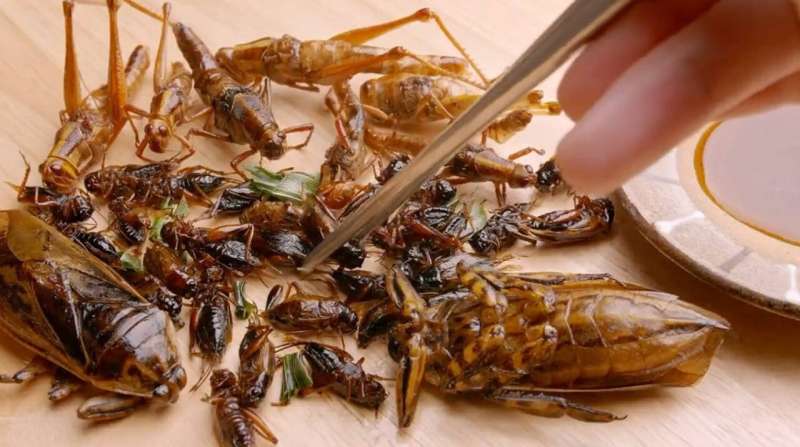This article has been reviewed according to Science X's editorial process and policies. Editors have highlighted the following attributes while ensuring the content's credibility:
fact-checked
proofread
Q&A: Good grub—why you should consider eating bugs

More than 2 billion people regularly eat insects—on purpose. They're a great source of protein for communities around the world and some are considered delicacies reserved for special occasions. And it's entirely possible that eating bugs could become more common in the U.S. too.
To discuss why the practice of eating arthropods, or entomophagy, is gaining in popularity, UCR Magazine called on Erin Wilson-Rankin, a professor in the Department of Entomology. She teaches a course for nonmajors about the history of insects, including who eats them and why.
Wilson-Rankin discusses the benefits of bug eating and why Western countries should embrace it.
How do you introduce students to the concept of eating insects?
The first thing I want to do is emphasize that this practice is not weird. There are 8 billion people in the world. If more than 2 billion are eating bugs, that's a decent percentage. It is a major source of protein for much of the world.
Which bugs make the most popular hors d'oeuvres?
You'll find the practice more common in countries closer to the equator. Globally, beetles are the most common insects to be consumed, followed by butterflies and moths. People usually go for the larvae, because they're soft protein bags of goo, or the pupae, a form in between larva and the adult stage.
There are geographic patterns that determine which insects are the most commonly eaten. Caterpillars are super popular in sub-Saharan Africa. You'll find ants, wasps, and bees are most common in Latin America, where they're very abundant. In Colombia, they roast ants and make flour from them. People collect ant larvae from agave fruits and put them in burritos or garlic sauce.
What are some of the benefits of eating bugs?
Raising insects for food does not impact the environment in the same way that chicken or beef does. It's more sustainable, so even people who prefer avoiding beef and chicken may be inspired to use this as a form of protein because of the environmental benefits. Way fewer greenhouse gases are involved compared to raising pigs or cattle. It is just a more sustainable way to feed people and could help contribute to global food security.
It varies depending on the insect you're farming, and whether we're talking about larvae or an adult insect, but let's compare some basic numbers: For 100 pounds of grass, you can produce three pounds of beef, 30 pounds of chicken meat, or 35 pounds of some caterpillars. For the input, you get more protein output.
The most protein per unit of mass are probably going to be your grasshoppers, crickets, and locusts. Those are really high in protein relative to fat. But you'll get a lot of other things with them, including antioxidants, anti-inflammatories, essential amino acids, and fiber.
Oftentimes, we're told insects carry bacteria or toxins. Is this a concern when eating them?
Viruses causing foodborne diseases don't typically replicate in arthropods, but edible insects could become contaminated during processing or distribution. If you're worried about it, do the same as you would with vegetables or eggs. You wash those before you eat them, too. And as with raw meat, you would cook them as well, which would likely eliminate any major pathogens, like E. coli.
I don't know of a whole lot of insects that accumulate toxins naturally. There are a few exceptions, like monarch caterpillars that accumulate toxin from milkweed plants to avoid being eaten by predators. But the most commonly eaten species do not bioaccumulate.
Tarantulas do need special preparation but only because their hairs can cause irritation.
Do insects have cholesterol?
Good question! They do have some mono and polyunsaturated fats.
More importantly, in my mind, insects have nutrients in them that you can get from other plant sources, but not from other protein or meat sources. There are antihypertensive components, like anti-inflammatories and antioxidants. We may one day take extracts of these compounds from insects.
What is keeping people in Western countries from eating bugs?
Who says we don't? It is estimated that an average American eats about 2 pounds of dead insect parts a year in their food that they don't know about. The Food and Drug Administration sets what is called "food defect action levels," which determine how much contaminant is allowed in our food supply.
For example, you're allowed to have 60 or more insect parts per 100 grams of chocolate. Peanut butter is similar. You can also have more than 2,500 aphids per 10 grams of hops used to make beer. Insect fragments in our food are considered an aesthetic problem. Most do not pose a health hazard. There are also certain activities that lend themselves to insect eating. Cyclists eat way more insects than your average non-cyclist because while they're biking, their mouths are often open. Same with motorcyclists, unless they use full-face helmets.
Because of the environmental benefits, a lot of Michelin-star chefs have been getting into this. The high-end ice cream parlor Salt and Straw has a Halloween ice cream with mealworms and crickets. Celebrity chef Joseph Yoon is a good spokesperson for the movement, and they serve his recipes at restaurants where people pay upwards of $500 to get in the door. Our Western culture has a stereotype that eating insects is gross. We are going to have to fight against that if entomophagy is going to take off in our country.
There's a really interesting history. Lobsters are now a delicacy, especially in New England. But, once upon a time, they were scorned as the cockroaches of the sea. People would strike against employers for feeding them too much lobster. Then, lobster got a rebranding, and the general public started to see it differently. I think we need a rebranding for entomophagy.




















